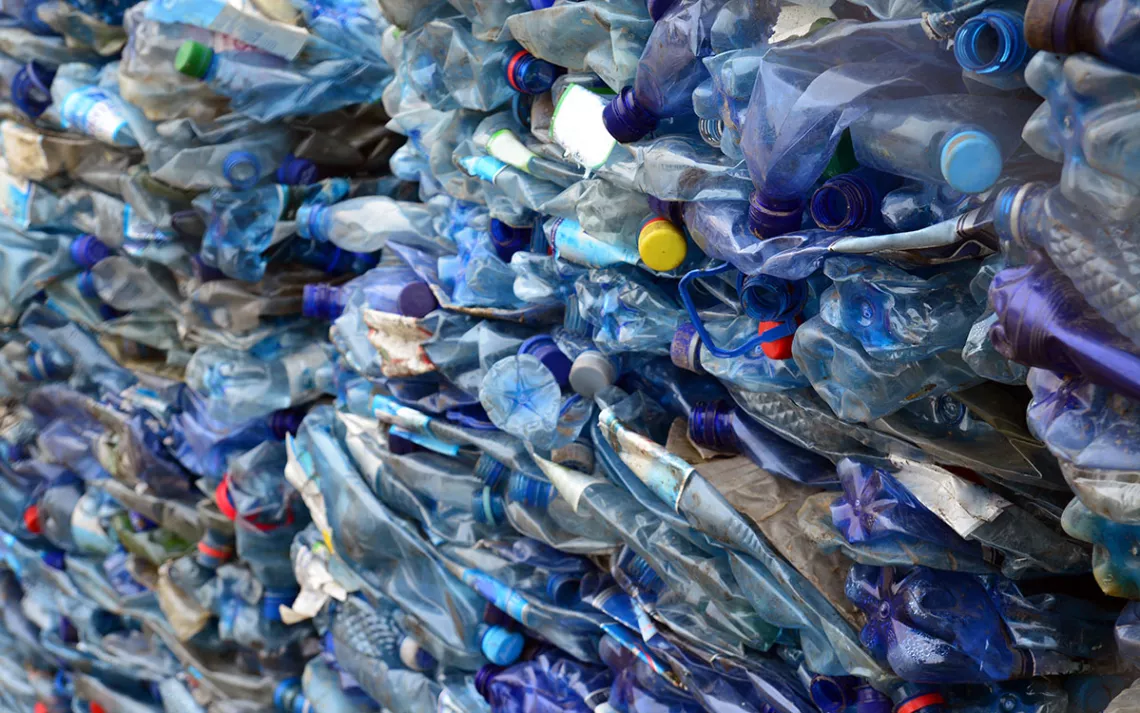The World Needs a Global Plastics Treaty Championing Urgent Action. Will We Get One?
Here’s what you need to know about the UN treaty on plastics

Photo by empire331/iStock
Trashed beaches and tides are often top of mind this time of year as Plastic Free July nears, highlighting the need to reduce, reuse, and recycle. Waste is undoubtedly the most visible aspect of the plastic tsunami. Yet the entire life cycle of plastic—from its origins in fossil fuel extraction, polymerization, and chemical processing to its ineffective end-of-life management— together impacts the climate crisis, pollution, and biodiversity loss. A global treaty could make governments, companies, and citizens equal partners in the critical effort to slash plastic production and pollution over the coming decades.
The second meeting of the Intergovernmental Negotiating Committee (INC) on Plastic Pollution—charged with developing a legally binding international treaty on plastics, including in the marine environment, by the end of 2024—wrapped in early June. The meeting evoked both the possibilities and the challenges of tackling the plastic pollution crisis. It followed INC-1, which took place late last year in Uruguay to develop a foundation for the treaty’s content. From May 29 to June 2, more than 700 delegates representing 169 member states convened in Paris to discuss an options paper outlining the treaty’s prospective obligations, measures, implementation, and compliance strategies to address plastic production, pollution, waste, and circularity and a just transition forward.
Unfortunately, a full day of discussion was lost to procedural debates dominated by countries with vested interests in the plastic, fossil fuel, and petrochemical industries that prefer consensus over majority voting, the former of which could create veto power—an issue that remains unresolved. Despite the setback, delegates eventually broke into two contact groups to discuss the objectives, obligations, and implementation strategies outlined in the options paper.
The week ended with the encouraging directive to develop a “zero draft” agreement to be reviewed at the third INC meeting, scheduled for November in Nairobi.
What to expect in the zero draft
Many delegates called for the treaty to “end plastic pollution” and “protect human health and the environment from its adverse effects throughout the life cycle of plastic.” Though how that will take shape, and on what timeline, remains to be seen.
A group of 58 High Ambition Coalition to End Plastic Pollution (HAC) countries, co-chaired by Norway and Rwanda, want a treaty that eliminates plastic pollution by 2040. The United States, notably, is not among them. Ultimately, the treaty’s efficacy will depend on whether its obligations are mandated or voluntary, global or national, just and bold—all targets expected to be further defined and debated in subsequent meetings. Avoiding corporate capture will be crucial to the instrument’s success.
Based on discussions in Paris, here’s what the zero draft could contain.
Reduce
Plastic consumption is on track to nearly double by 2050 if production continues at current levels. Many delegates supported establishing global targets bolstered by national commitments to reduce production of virgin plastic, problematic products (like single-use items), and microplastic additives through phaseouts, bans, and other controls. Members also united around eliminating plastic from entering soil, water, and air throughout its life cycle, with some advocating for binding provisions.
Efforts to reduce the use of chemicals and polymers of concern were met with both support and trepidation, with members calling for any bans to be based on clear evidence and criteria, and incentives for green chemistry to aid the transition. But plastics experts warn that weak regulations around polymers and the thousands of chemicals used in plastics will only perpetuate its long-standing toxicity.
Redesign for reuse
Reducing virgin plastic production will require an overhaul of the plastic life cycle. Many delegates supported the development of national design criteria for plastic circularity, and requirements for products and packaging to conform to those standards. Some had concerns about adopting global measures. However, a lack of international guidelines would be an impediment for businesses that see harmonized regulations as critical to their success in co-creating a circular economy for plastics.
Delegates also want clear criteria developed on safe alternatives to fossil-fuel–based plastics, though some dissuaded against biobased and biodegradable substitutes, and others called for incentivizing R&D.
Recycle: waste management and remediation
Since 1950, 9.2 billion tons of plastic waste have been generated, 90 percent of which has never been recycled, posing an enormous burden to current and future generations. Many delegates supported strengthening waste management broadly and addressing existing plastic pollution with urgency, including legacy waste, fishing ghost gear, and remediating pollution hot spots.
Of concern was disagreement on prohibiting options for paper labeled as dangerous and damaging practices for removing plastics, such as open burning, incineration, and chemical recycling. Some argued these methods should not be prohibited, citing a current lack of alternatives and referring to chemical recycling as an evolving field.
Delegates debated whether extended producer responsibility (EPR) schemes requiring companies to manage their own product and packaging waste should be obligated, and whether targets should be global or national. Some cautioned that if EPR is not obligated globally, it could become ineffective. Even major companies from Coca-Cola to Walmart and Unilever are calling for mandatory, well-designed EPR.
Repair: supporting a just transition
People of color are disproportionately impacted by plastic pollution throughout its life cycle. A truly just transition to a circular economy for plastics must involve the communities most affected by its production and pollution, including informal waste workers across the globe. The delegation broadly supported provisions to ensure an inclusive transition, one aimed at reducing waste and alleviating poverty, noting that EPR and waste management standards should aid the transition.
It was agreed that financial assistance, access to technology, and capacity building will also be necessary to ensure equity and success, and that a financial mechanism should be accessible, needs-driven, and derived from a variety of sources. It was emphasized that developed nations have a responsibility to make funds available to developing nations and to aid in technology transfer with the private sector.
Regulations, implementation, and compliance
Though the debate around whether the treaty’s obligations should be national, global, or a combination is ongoing, national action plans and national reporting are likely to appear as requirements in the zero draft. Critically, some stressed that national plans “must not be the only legally binding provision of the future instrument.” Others envisioned national action plans that would enable countries to set their own targets, much like the Paris Agreement. Delegates recognized flexibility would be needed to support some countries and called for compliance to be facilitative. But steps toward an inclusive and equitable treaty cannot allow high-polluting countries and corporations to weaken its legally binding obligations.
Take action
A new report from Pacific Environment portends that a 75 percent reduction in plastic production is needed by 2050 to avoid a disastrous increase in global temperatures. For the plastics treaty to make the impact the world needs, it must include legally binding obligations, international targets, harmonized policies, fair financing, and an urgent timeline for eliminating virgin production, single-use items, and toxics while improving waste management and design.
This is the moment to demand public officials and corporations stand behind a strong and collaborative treaty that will protect people and the planet over profits and plastic. Committee members and observer organizations may submit written comments to the secretariat on topics not discussed at INC-2, and companies should be encouraged to join the Business Coalition for a Global Plastics Treaty.
As for the world’s leading plastic polluter, the United States must become an active partner in the global effort to end plastic pollution and join the nearly one-third of UN member states in the High Ambition Coalition before it’s too late.
 The Magazine of The Sierra Club
The Magazine of The Sierra Club



